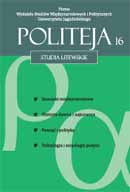Refleksje nad litewską polityką zagraniczną
Reflections on Lithuania’s foreign policy
Author(s): Evaldas NekrašasSubject(s): Politics / Political Sciences
Published by: KSIĘGARNIA AKADEMICKA Sp. z o.o.
Summary/Abstract: The article deals with the fundamentals of Lithuanian foreign policy. It is an attempt to evaluate its foundations, principles, advantages and shortcomings. Author’s point of departure is a non -official paper “Lithuania’s Foreign Policy Concept” prepared by the Lithuanian Ministry of Foreign Affairs in 1994. Strategic goals of the Lithuanian foreign policy laid down in that document were the basis of the Lithuanian foreign policy making until the country joined the EU and NATO in 2004. Having supposedly attained those goals Lithuania adopted and proceeded to implement hastily the so -called “new Lithuanian foreign policy” conducted in 2004 -2009. Yet the author has serious doubts that the strategic goals of the Lithuanian foreign policy as defined in 1994 were fully achieved in 2004. The goals were three: (1) NATO, (2) EU, (3) good relations with neighbours. Yet Lithuania still is not a full -fledged member of either the EU or NATO. It is a mere newcomer. And its relations with Russia in 2004 -2009 got even worse than they were in the late nineties. The article proceeds to exploring a rather strenuous question: are the tensions between the two countries caused solely by the Russian misbehaviour as Lithuanian politicians mostly claim or is the Lithuanian foreign policy also to blame. The relations with Russia are examined in the context of Lithuania’s relations with the US and the EU. The crucial idea of the “new Lithuanian foreign policy”, that of the center or leader of an unnamed and undefined region, presumably of the Eastern Europe or at least a part of it, is put under scrutiny. The author claims that (1) for a small country such a role is utterly unrealistic, (2) attempts to play that role have nothing to do with national interests the foreign policy should serve, (3) playing the chosen role complicates relations both with other EU countries and with Russia. The author makes the conclusion that the foundation of the Lithuanian foreign policy must be its Western, not Eastern policy. At the very end of the article an attempt is made to examine and evaluate the changes Lithuanian foreign policy suffered in 2009 -2010.
Journal: Politeja - Pismo Wydziału Studiów Międzynarodowych i Politycznych Uniwersytetu Jagiellońskiego
- Issue Year: 8/2011
- Issue No: 16
- Page Range: 79-93
- Page Count: 15
- Language: Polish

